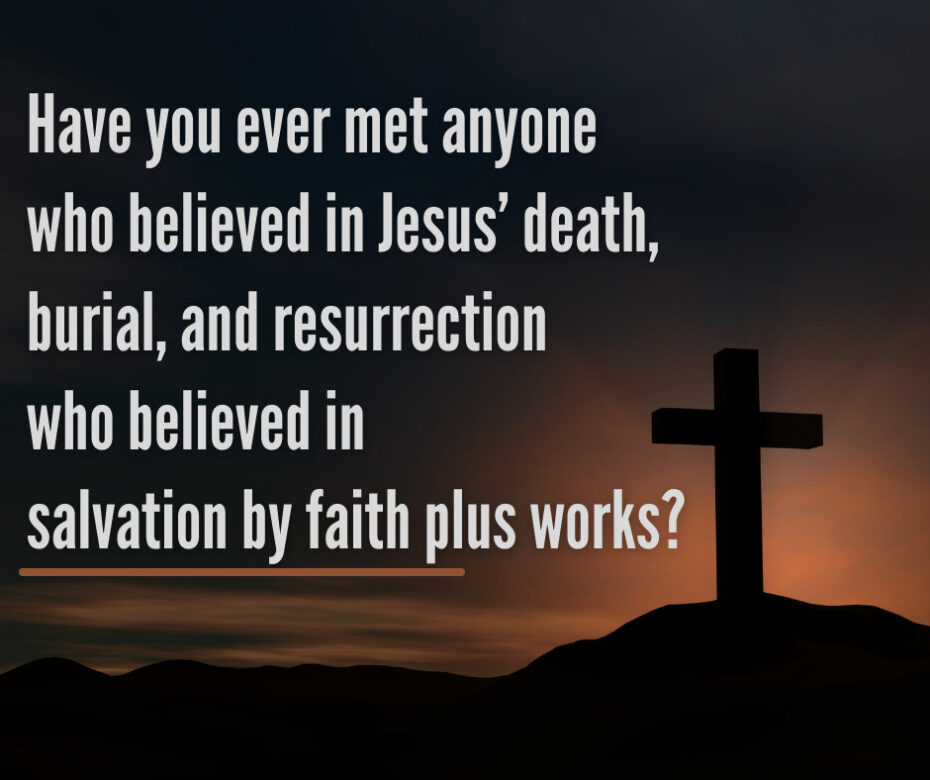A podcast listener, EJB, asks a question about the finished work of Christ:
While I agree with Free Grace, I’m wondering why you don’t include the death, burial, and resurrection in the believing? You say to believe in Jesus, but I don’t hear anything about believing in the perfect work done on the cross for the payment of our sins. Thanks!
EJB is alluding to 1 Cor 15:3-4, where Paul identifies his gospel as the message that Jesus died for our sins, was buried, and rose from the dead. I assume that what he means by the words you don’t include is that we do not say that anyone who believes in Jesus’ death, burial, and resurrection is born again. Or, stated differently, we don’t say that anyone who believes the gospel is born again.
The term gospel means good news. The death, burial, and resurrection of Jesus is good news. It is the reason why the promise of John 3:16 is true. Without Jesus’ finished work on the cross, He could not guarantee everlasting life to everyone who believes in Him.
We must believe 1) in Jesus 2) for what He promises, everlasting life (= irrevocable salvation) in order to have that life. The gospel should lead us to believe in Jesus for everlasting life. But that is sadly often not the case today. Most people in Christianity believe in the gospel, yet they are not born again. The reason is that they have not yet believed in Jesus for everlasting life.
If you look at how the Lord Jesus evangelized, as reported exclusively in the Fourth Gospel, you notice that He never promised everlasting life to those who believed He would die, be buried, and rise from the dead. He promised it to those who believed in Him for everlasting life.
Some think that the saving message changed after the birth of the Church. That is not possible for the simple reason that John’s Gospel was written during the church age to call unbelievers during the church age to believe in Jesus for everlasting life (John 20:31). John did not give a history lesson about some former way of salvation that is not valid any longer.
It is possible to read the Book of Acts in such a way as to conclude that the saving message changed. But that ignores the purpose of John’s Gospel, and it misunderstands the reason why Peter and Paul proclaimed Christ’s death and resurrection. They proclaimed it to prove that He is the Messiah. They never said that anyone who believes that He died and rose again has everlasting life.
An expression I heard in a recent debate is called confirmation bias. Psychology Today defines it this way: “Confirmation bias occurs from the direct influence of desire on beliefs. When people would like a certain idea or concept to be true, they end up believing it to be true. They are motivated by wishful thinking. This error leads the individual to stop gathering information when the evidence gathered so far confirms the views or prejudices one would like to be true” (see here).
If you grew up in a church that taught that whoever believes that Jesus died on the cross, was buried, and rose from the dead is born again, you are likely to keep on believing that even in the face of contrary evidence.
Look at John 4:10 and Eph 2:8-9. Both speak of everlasting life as the gift of God and of Jesus as the Giver of that gift. We must believe in both the gift and the Giver. To believe that Jesus died and rose again is not the same as believing in His gift, everlasting life.
I’ve often said that I’ve never met a person who claims to be born again who says both of these things: 1) I know I have everlasting life that can’t be lost because I believe in the Lord Jesus, and 2) when I first believed in Jesus for everlasting life, I did not believe in His death and resurrection on my behalf. Everyone I’ve ever met who professed to believe in Jesus for everlasting life also said he believed in His death and resurrection.
But I have met lots of people who said the opposite: 1) I don’t know where I am going when I die because I’m not sure if I will persevere in good works, and 2) I believe that Jesus died on the cross for my sins and rose bodily from the dead. That includes Roman Catholics, Eastern Orthodox, the cults, and most Protestants.
Jesus’ death, burial, and resurrection prove that He has dealt with our sin problem so that if we simply believe in Him for the gift of everlasting life, we have that irrevocable gift.
Maybe I could reverse EJB’s question: I’m wondering why so many preachers don’t include the certain promise of everlasting life for whoever believes in Jesus when they evangelize?


